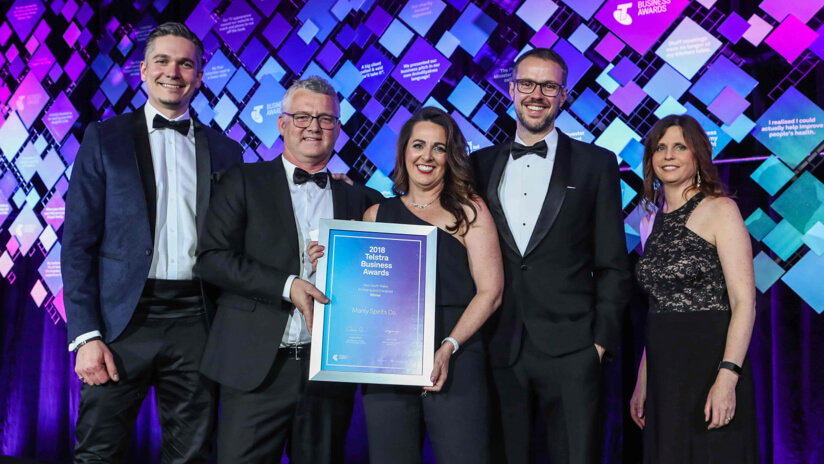How to find balance by outsourcing as a small business
If you want to save time on daily tasks, there are changes you can make to your business plan. Learn how outsourcing can help your business increase its efficiency with tips from award-winning Australian small business Manly Spirits Co.

David Whittaker and the Manly Spirits Co. Team at the 2018 Telstra Best of Business Awards.
How outsourcing helps you find more hours in the day
Running a small business can be rewarding but with so many tasks to get done daily, it can be hard to find time to focus on what’s really important: creating products and services you’re proud of.
If you want to maintain work-life balance as a small business owner, outsourcing certain tasks may help save you time. Other benefits of outsourcing include helping your business to improve productivity and efficiency.
Tips on how to outsource from an award-winning Australian small business
As the co-founder, director and distiller of artisanal beverage-maker Manly Spirits Co., David Whittaker understands the challenges of achieving work-life balance all too well.
Here, the 2018 Telstra Business Awards winner speaks with us about the benefits of outsourcing, and how delegating to the experts lets him concentrate on the big picture, not the small one.
Smarter Business: Why did you decide to outsource some of the tasks of running your business?
David Whittaker: My co-founder Vanessa Wilton and I started Manly Spirits Co. because we wanted to do something for ourselves and create a company [that] we could be passionate about. But as the business evolved from an idea into a reality, a lot of questions cropped up: How do we do our HR? How do we do our IT? How do we do our inventory and customer relationship management? We’re passionate about craft spirits. But when you’re a small business, most of your time is taken up with all the little practical things that make that business operational.
In reality, I’d say running a business is about 5 per cent glory, 95 per cent hard work. You have to systematise things to grow, so we decided to start outsourcing some of those more basic tasks, to give us more time to focus on the important things.
Smarter Business: How did you choose which tasks to outsource and which ones to keep doing yourself
David Whittaker: We found it made sense to outsource generic skills like book-keeping, accounting and payroll rather than bespoke ones specific to craft spirits. And that principle is probably true no matter what business you’re in.
Outsourcing those general tasks has worked really well for us, as it’s removed a lot of the mechanistic, day-to-day grind and let us focus on running the business. That said, I’d recommend businesses outsource just one task at a time, rather than doing everything all at once. That way you can monitor how things are going and get the processes working right.
Smarter Business: Have your outsourcing needs changed over time?
David Whittaker: Absolutely. For the first two years I did all the book-keeping myself, because it was useful to keep a tight control on cashflow early on. But then once we got to a certain stage, we outsourced that, too.
Then there are things you might want to outsource for a time and bring back in-house later. We’ve just started doing our own social media, but outsourcing that in the beginning was a great way to get things going. We just didn’t have the time to do it properly back then, and it was a lot cheaper to outsource than to dedicate a whole staff member to it.
There are also tasks you might want to split between outsourcing and insourcing. For instance, Vanessa designed our website in-house, but we’ve outsourced tricky technical things like ticketing and vouchers to web developers when needed.
Smarter Business: How easy is it to start outsourcing and see results?
David Whittaker: There’s a fair bit of work you have to do to set things up properly, but if you’re conscious of that and are willing to put in the resources, outsourcing can ultimately be a huge time-saver.
The reason it can take a bit of work to set up is because you’ll want to establish a process for monitoring the efficacy of anything you outsource. And efficacy may change over time. For instance, in a few years, we might be steadier on our feet and not need to outsource something we’re currently paying someone else to do. You also have to monitor for quality, to ensure things are being done at the right level, and set up feedback processes.
Smarter Business: What advice would you give other small business owners about improving their workflow management, growing their organisational skills or regaining a little work-life balance?
David Whittaker: As a small business owner, it’s really easy to become the operational linchpin – if you’re not there, nothing works. That’s dangerous. The ultimate thing you can do is to outsource yourself. Find people who can do the mechanistic stuff so you can focus on business development. If you don’t spread some of that responsibility, you can’t grow. And if you’re just doing stuff to make things work, you’re not thinking strategically.
Insights to power your business today and tomorrow
Download your Tech State of Play report to help propel your business further through technology.
Ideas for unlocking goliath productivity
Insights and tips for small and medium businesses to boost productivity and empower teams.




